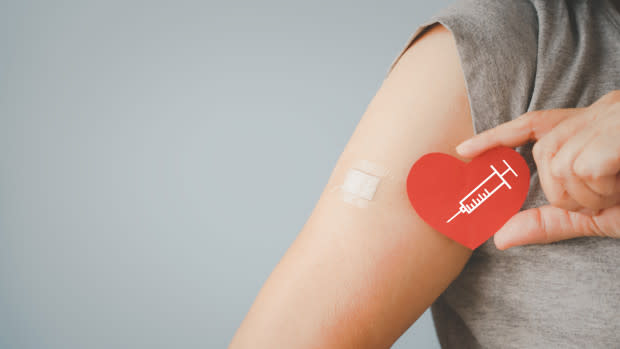COVID Cases Are Officially Back on the Rise—Here’s How You Should Time Your COVID Booster (And Flu Shot)

As fall approaches, we have so much to look forward to: crisp mornings, apple picking and pumpkin spice lattes, to name a few.
But the arrival of fall also means cold and flu seasons are on the way—and the Eris variant means COVID cases are already climbing, along with hospitalizations. You've likely been getting messages from your doctor's office and pharmacy reminding you that it's time to schedule your vaccines, but should you get your COVID and flu shots at the same time? And if not, which one should be prioritized?
Parade spoke with an infectious disease expert to find out. Here's what they had to say.
The Ideal Time To Get Your COVID Booster and Flu Shot
Even with the new surge in COVID cases, Dr. Shirin Mazumder, MD, an infectious disease expert at Methodist Le Bonheur Healthcare in Memphis, Tennessee, recommends waiting until the fall to get your COVID and flu vaccines.
"September or October is the ideal time to get vaccinated," she explains. "Immune protection from vaccines can wane over time, so the timing of vaccine administration is important. Obtaining the flu and COVID vaccines in September or October allows people to build immunity and have it last throughout the peak of the respiratory virus season."
Related: Here's What COVID Symptoms Look Like Day by Day
The exceptions, she says, are pregnant mothers in their third trimester so they can pass on protection to their babies, and children under the age of eight who are getting their flu vaccine for the first time. "Children in this category need two doses of the flu vaccine four weeks apart and this allows them time to get the second dose before the peak of flu season. "
Related: What To Know About Flu Shot Side Effects
Should You Space Out Your COVID Booster and Flu Shot?
Last year, some people reported being completely taken down after getting the COVID booster and flu shot at the same time. While, medically, getting both shots together is completely safe, some people want to spare themselves the side effects.
But, Dr. Mazumder says, this probably isn't a good idea: "It is safe to get a COVID booster and flu vaccine at the same time and may be better as it's a convenient option for many people. Coadministration of the flu vaccine and COVID booster ensures that people get all of their recommended vaccines in case they are not able to return for additional vaccine doses at a later time."
That being said, if you do want to space out these vaccines, does it matter which one you get first? No, Dr. Mazumder says, explaining, "It does not make a difference if people get the flu vaccine or COVID vaccine first. There is no recommended waiting time between these vaccines."
Related: How Exercise Could Make Your COVID Vaccine More Effective
Other Tips To Protect Your Immune System This Fall
Getting vaccinated with available vaccines is the single best thing you can do for your immune system this fall. Even if these shots don't protect you from getting COVID or the flu, they will make your symptoms milder.
But there are other lifestyle tweaks that can help too. "Good hand washing, avoiding sick people when possible and wearing a high-quality mask in high-risk settings are additional precautions that can prevent respiratory viruses," Dr. Mazumder says. "Other healthy habits like eating healthy foods, drinking plenty of water, regular exercise and reducing stress are also beneficial."
Will you experience increased side effects if you get your COVID and flu shot at the same time? Maybe. But if you opt to get these shots in different arms (arm soreness is one of the most common side effects of both vaccines), you can reduce the side effects.
Overall, doctors (and the CDC) feel that the benefits of coadministration—particularly, the convenience factor, which increases the likelihood that you will get both shots this year—outweigh the costs. So schedule your appointment for early September and get ready to roll up your shirtsleeves!
Next up: The Most Common Symptoms of the COVID Variant Eris
Sources
Dr. Shirin Mazumder, MD, an infectious disease expert at Methodist Le Bonheur Healthcare in Memphis, Tennessee
Getting a Flu Vaccine and COVID-19 Vaccine At the Same Time. Centers for Disease Control and Prevention (CDC).